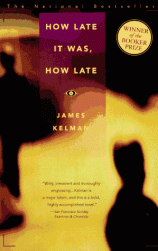Reading Group Guide
Discussion Questions
How Late It Was, How Late

1. Kelman's novel begins with, "Ye wake in a corner and stay there hoping yer body will disappear, the thoughts smothering ye; these thoughts; but ye want to remember and face up to things, just something keeps ye from doing it, why can ye no do it; the words filling yer head: then the other words; there's something wrong; there's something far far wrong; ye're no a good man, ye're just no a good man." How does the opening sentence set the stage for the action of the novel? What kind of tone and message does this sentence prescribe?
2. Kelman has chosen to use the Glaswegian dialect rather than standard English. How does this affect the reader? Does it help create a stronger Scottish atmosphere pulling the reader into Sammy's world? Does it make the reader pay more attention to the language being used? Why did Kelman make this choice?
3. What are the roles of blindness in the novel? Would Sammy's predicament and experiences be very different if he could see?
4. Many critics suggest that the language in How Late It Was, How Late is comparable to rap and hip-hop because Kelman uses the same unrelenting vulgarity even some of the same refrains ("Know what I'm sayin"). Kelman readily accepts this parallel. Discuss how his language meets this analogy and where it doesn't work.
5.How important is profanity to the text? Would the novel change if there were fewer obscenities?
6. Critics have described How Late It Was, How Late as a violent text. How can it be violent when there are no guns or knives and there is no brawling?
7. Discuss Sammy's relationship with Helen in the novel. How does his rage toward his blindness interfere with this relationship?
8. One of Kelman's great skills is taking his readers inside the complex mind of his blind character. One critic described this phenomenon by saying, "We think along with him, probing our way with a homemade white stick and a crude yet resourceful intelligence." What tools does Kelman use to produce this effect?
9. Why does Kelman create a hero like Sammy, a blind, alcoholic ex-convict, who has so many strikes against him?
10. The welfare bureaucracy in How Late It Was, How Late persecutes Sammy rather than helps him. Are there any clues in the text as to why Kelman's vision of society is so grim?
11. In his acceptance speech for the Booker Prize Kelman said, "My culture and my language have the right to exist and no one has the authority to dismiss that right." How does Kelman make his culture exist on the page? How does he ensure that it is not dismissed?
12. Why did Kelman choose to call his book How Late It Was, How Late? How does the title relate to the novel?
How Late It Was, How Late
- Publication Date: February 1, 1996
- Paperback: 384 pages
- Publisher: Delta
- ISBN-10: 0385315600
- ISBN-13: 9780385315609






